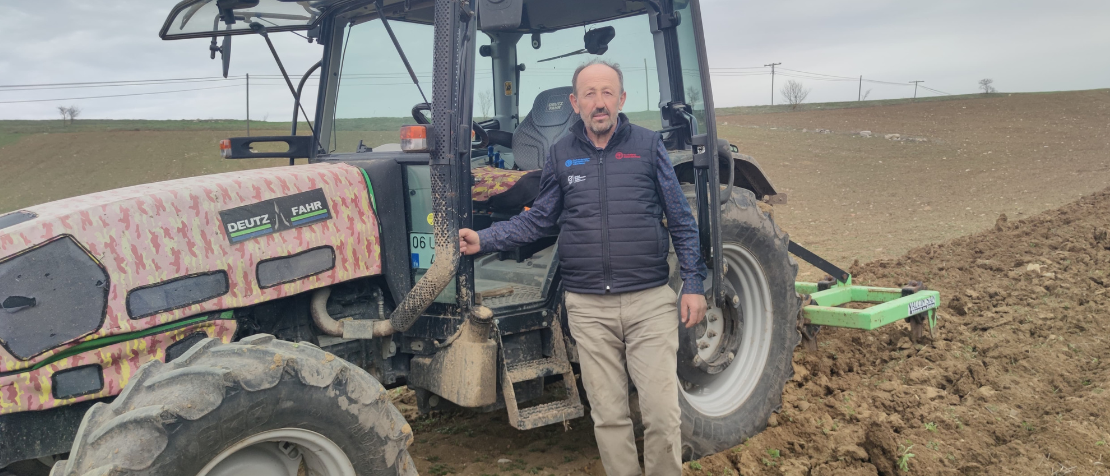Kamil Yıldız: A role model farmer for Earth Day

©FAO/Veysel Dönderalp
Today is Earth Day, a time to reflect on and to take local actions to safeguard the land and the environments that sustain all life. We each play a part and all efforts for sustainability are worthwhile.
In Adaköy, a village in the Yeniçağa district of Bolu, Kamil Yıldız farms in the quiet embrace of nature. Kamil leases idle fields in the village, cultivating a total of 300 decares of land. To sustain the family farm, he grows wheat, barley, oats, alfalfa, forage peas and silage maize. Most of these crops are used as animal feed, except for wheat, which he sells.
“I have worked in agriculture and livestock farming with my father for many years,” says Kamil Yildiz. Though this 52-year-old experienced farmer maintains the traditional farming methods passed down from his father, his own journey has taken him to implementing sustainable farming techniques that have resulted in healthier soils and increased production.
A new era with agroecology
In 2012, when he took on full responsibility for the farm, Kamil decided to experiment with new production methods. While searching for ways to integrate traditional farming techniques with modern agriculture, he came across the Bolu project, implemented by the Food and Agriculture Organization of the United Nations (FAO) and the Ministry of Agriculture and Forestry, and the Yeniçağa District Directorate of Agriculture and Forestry. “I had heard of agroecology on television, but I didn’t have much practical knowledge,” he says. Through the FAO project, he learned techniques such as proper fertilization and crop rotation, which together protect soil health by increasing plant diversity— new knowledge which he integrated with his own existing skills and expertise.
The Bolu Project on agroecology provided soil analysis training which enabled Kamil Yıldız to learn about the organic matter content and pH levels of his soil. These analyses helped him realize that using natural fertilizers like animal manure and compost in place of chemical fertilizers – and applying only as much as the soil needed – would make his land more productive over the long term. Additionally, he learned how to maintain the soil’s nutrient balance naturally by planting nitrogen-fixing crops such as alfalfa and vetch.
In the first year, the results didn’t quite meet his expectations, but he persisted. “Giving up was not an option, the soil ecosystem takes time to regenerate,” he explained. During the FAO training sessions, he was introduced to the Sustainable Land Management (SLM) model, which recommends the cultivation of perennial forage crops instead of annual farming to increase soil organic carbon. Taking this into account, Kamil Yıldız decided to expand the cultivation of alfalfa and vetch to ensure the long-term health of his soil, and he has increased efficiency by using more certified and locally adapted crops.
Next, after discovering agroecology and having farmed traditionally for years, Yıldız decided to experiment with new crops. To make use of a field with no irrigation and limited natural rainfall, he decided to plant sunflowers. Although hesitant at first, he achieved much better yields than expected thanks to the use of proper crop selection and rotation, which allowed the soil to rest. Moreover, his yield attained the average national level for sunflowers, reaffirming the importance of sustainable farming. Now, he takes pride in using his land more consciously and steering his production in a new direction.
Kamil Yıldız has now become a source of knowledge for other farmers in his village, due to the growth in yields of wheat, barley and other crops he has planted. He confidently recommends the methods taught by the FAO project and freely shares the knowledge he has acquired.
Looking ahead: sustainable farming
The project fundamentally changed Kamil Yıldız’s perspective on agriculture. “I gained a deeper understanding of the soil ecosystem and started approaching it more consciously,” he says. Now, he sees farming not just as a means of livelihood but as a legacy that must be preserved for future generations.
To Kamil Yıldız, agroecology is not just a matter of protecting the soil, it involves creating a sustainable model for all farmers in the region. “We must protect our greatest treasure – the soil – and do so with awareness,” he emphasizes. “I sincerely thank FAO, the Ministry of Agriculture and Forestry, and everyone who played a role in making this project possible. With their help, I’ve come even closer to realizing my vision of sustainable farming.”
A legacy for future generations
Kamil’s story is not just about one farmer’s professional evolution: It highlights how knowledge and modern techniques can make a profound difference in agriculture. His efforts to improve the health and fertility of his land by blending traditional methods with modern agroecology impacted not only his village but also the ecosystem.
On Earth Day today, his story reminds us of our responsibility towards the soil. The environmental challenges our world faces highlight how critical sustainable farming and conscious production methods are. Together, let’s work in harmony with nature to leave a healthier and greener world for future generations. Remember, each individual’s contribution can be the spark for great change.
Video:
